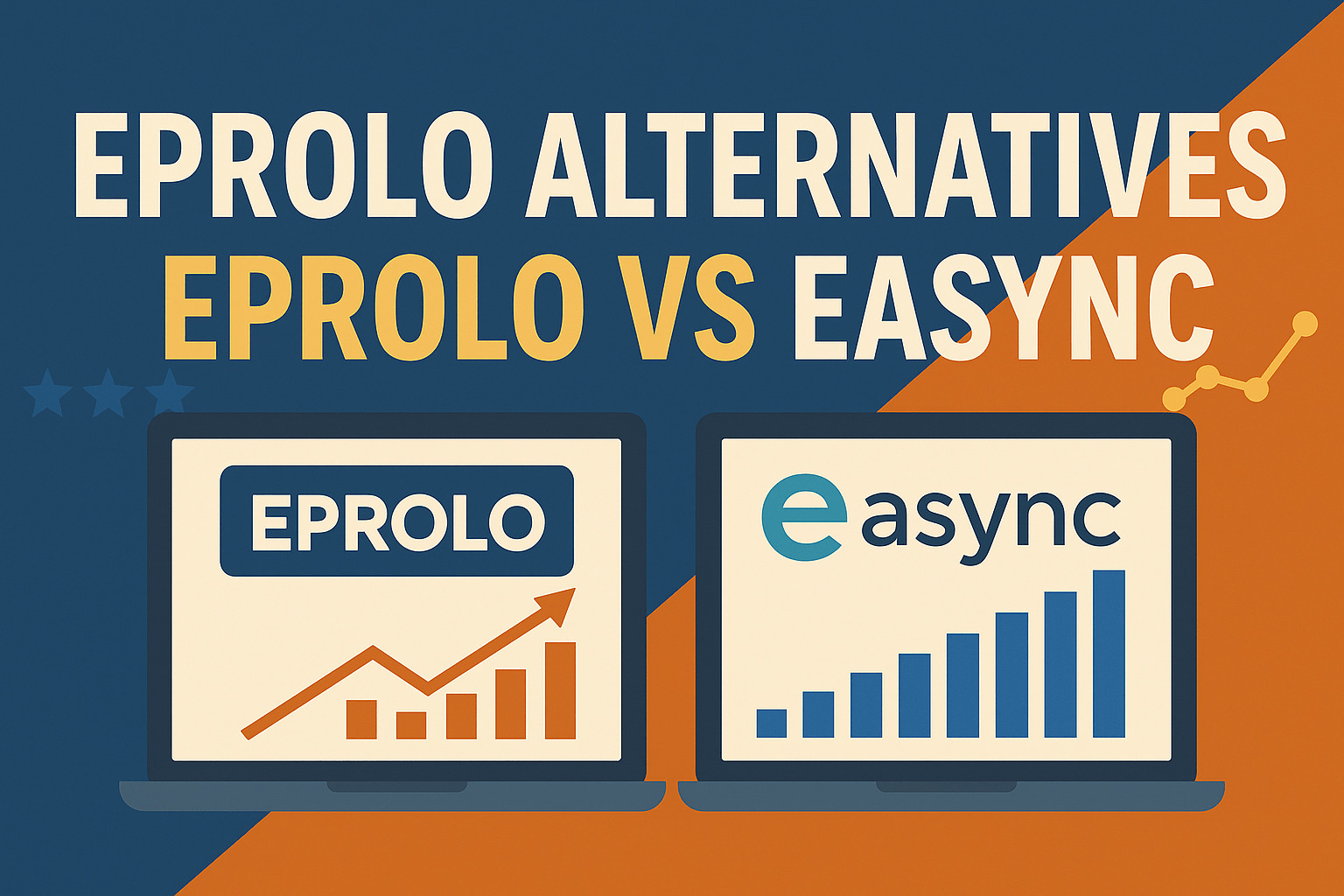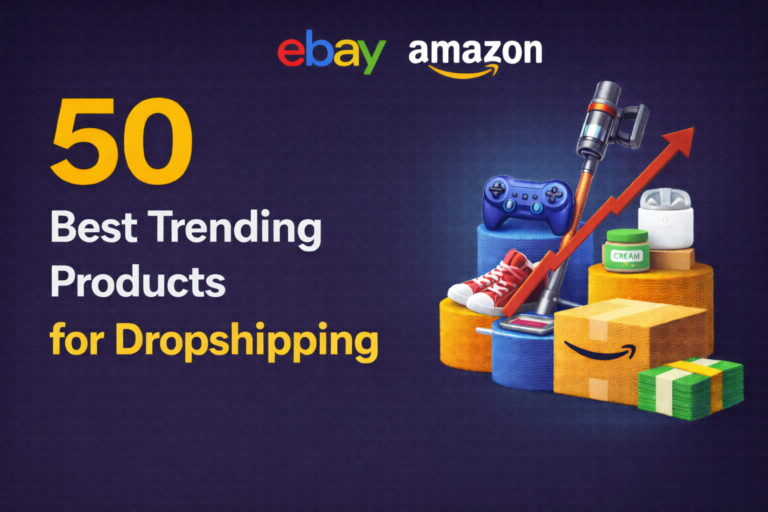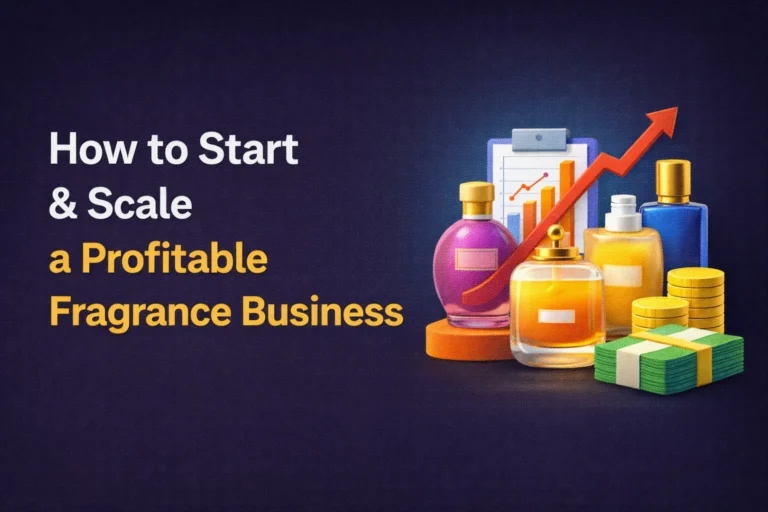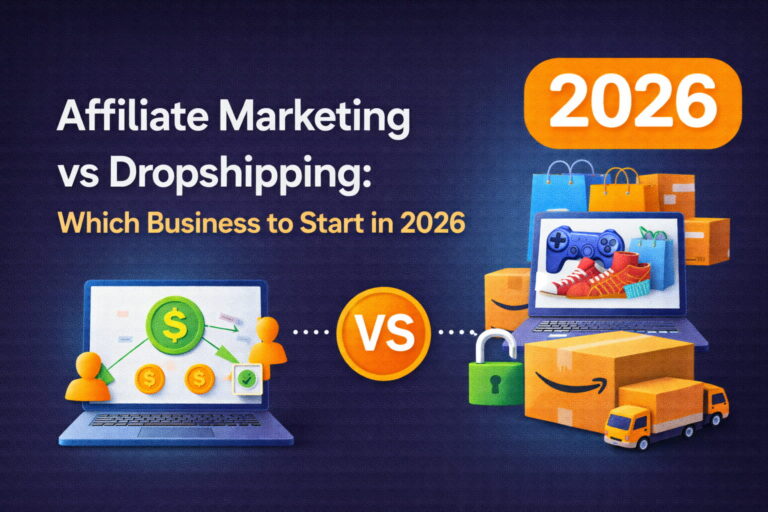Running a dropshipping business in 2025 has evolved far beyond just picking products you think will sell. Picking a platform to manage behind-the-scenes elements like inventory, pricing, fulfillment, and supplier communication is all part of the trade. It’s for this reason a lot of fresh sellers tend to adopt tools that promise simplicity from the first click.
At first glance, Eprolo seems to check all the boxes for an all-in-one solution. Built-in warehousing, fulfillment, and a simple way to connect your existing stores make it easy for sellers to brand, package, and launch quickly.
Easync takes a different approach. With less emphasis on packaging and branding, Easync provides powerful automation, repricing, stock monitoring, and automatic ordering.
So which model actually works better? Is it smarter to start with a plug-and-play supplier like Eprolo? Or should sellers be prioritizing flexibility and automation with platforms like Easync from the start?
Here, we’ll be looking at Eprolo’s strengths and limitations, and then break down how Easync compares. By looking at aspects like pricing, platform support, supplier access, and reviews by real users, you’ll get a clear picture of which tool is built for scaling in 2025.
Eprolo vs. Easync at a Glance: Different Tools For Different Dropshippers
Before digging into Eprolo, let’s perform a quick comparison. Both Eprolo and Easync simplify the dropshipping process, but they go about it in very different ways.
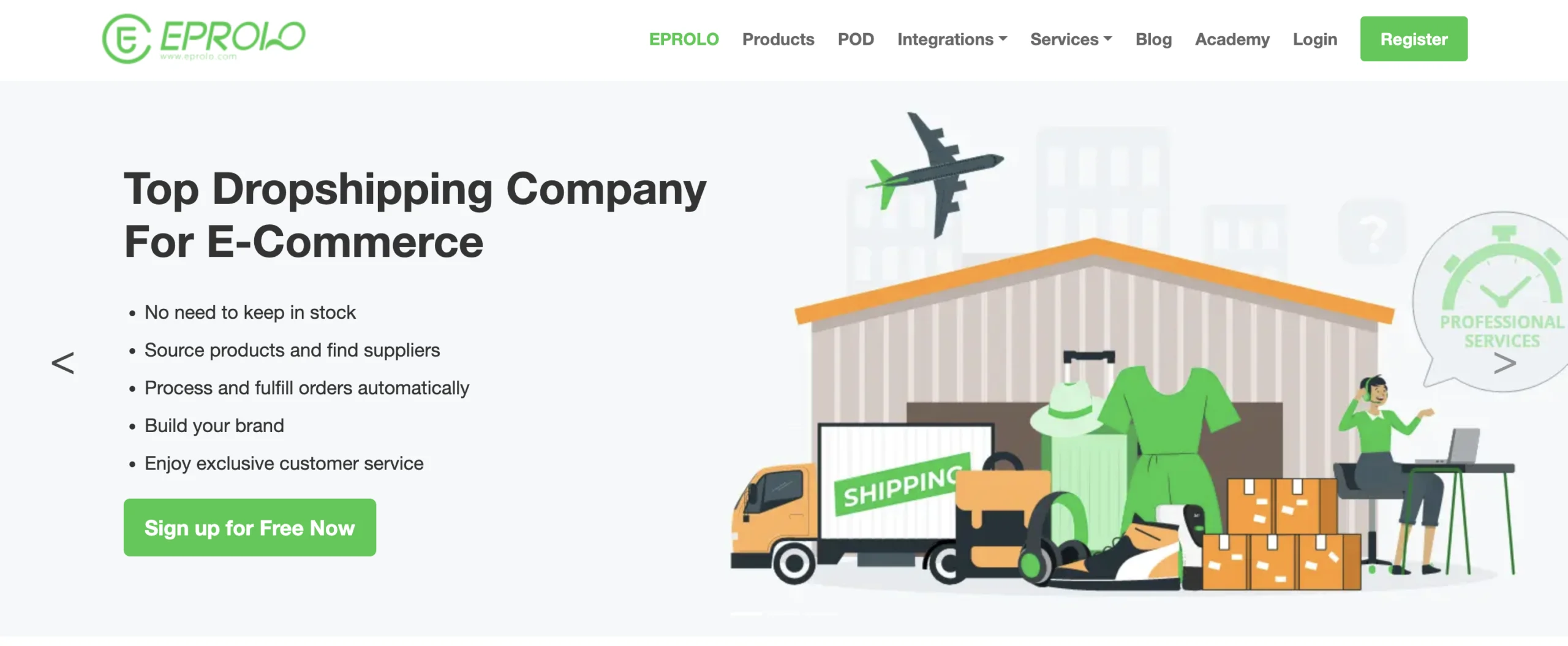
Eprolo leans heavily into convenience. It’s a centralized dropshipping platform that includes an entire supply chain: warehousing, product sourcing, branding, and fulfillment under one roof. Sellers can use it for product imports, inventory sync, and let Epolo handle packaging and shipping for them.
It’s aimed at newer dropshippers who have started their Shopify or WooCommerce journey and want to build a visually polished store with minimal effort.
Easync focuses more on building using automation and providing the means for scalability. It connects directly to eBay and Amazon while also supporting over 1,000 suppliers. Easync handles all the price tracking, stock updating, and automated ordering in as close to real time as you can get.
It doesn’t warehouse or provide branded tags and tape, but it does give new and experienced sellers alike the speed and flexibility to grow without having to keep tabs on everything.
Here’s a quick look at how they both compare:
| Feature | Eprolo | Easync |
| Platform Support | Shopify, WooCommerce, Etsy, Amazon, Shipstation, and more. | eBay, Amazon, Shopify, WooCommerce, Walmart, and more. |
| Order Fulfillment | In-house warehouses | Supplier-based, automated |
| Product Sourcing | Eprolo catalog, AliExpress, InkedJOY POD | 1000+ suppliers |
| Branding Options | Custom clothing tags, tape, packing bags, inserts | Not available |
| Print-on-Demand | Yes, with InkedJOY | No |
| Automation Tools | Extremely limited | AI-driven repricing, auto-ordering |
| Price/Stock | Manual, performed by Eprolo | Every 15 minutes (real time) |
We’ll explore each of these differences in more detail throughout this Eprolo review.
What Is Eprolo? And Who Is It For?
Eprolo launched with a simple idea and a compelling pitch: Make dropshipping easier for store owners by doing everything in one place. Instead of relying on a heap of third-party tools or chasing suppliers across multiple platforms, Eprolo took the centralized approach.
You source products from Eprolo’s catalog and import them into your store. Eprolo then handles the entire fulfillment process through its own warehouses located in China, North America, Europe, Japan, and Australia.
The platform is deeply connected to Shopify and WooCommerce, making it easy to start selling right after setting up even a basic store. Once you’ve linked your store, you can then browse thousands of products, customize listings, and push them live without leaving the dashboard.

Eprolo also includes a built-in Print-on-Demand (POD) service. That means you can offer personalized items like t-shirts, mugs, and accessories without holding the inventory yourself. Printing and delivery are handled by Eprolo and its partner networks.

This all-in-one model is quite appealing for new sellers who are focused more on niche merchandise, artwork, and visual branding.
Onboarding is non-intimidating and straightforward, with a guided setup that takes mere minutes and quick product selection. For beginners, it’s a major advantage.
Eprolo dropshipping is certainly not designed with advanced dropshippers in mind. It’s built to get you up and running quickly, especially if you already have a well-established Shopify and just want to focus on product presentation rather than dealing with a complex back-end.
What Eprolo is Good At (And What It’s Not-So-Good-At)
The strength of the Eprolo platform lies in its simplicity. For new sellers, especially those with WooCommerce and Shopify stores, it offers a true plug-and-play experience. It offers access to an extensive product catalog, built-in order fulfillment, and a handy POD service in one place.
Sellers add products and customize their listings, and Eprolo takes care of the rest.
Branding is another feature that Eprolo excels at. It allows merchants to design custom packaging and inserts, and have their logo printed on the packing tape. It’s a level of white-label support that’s fairly rare in beginner-friendly tools. The branding makes it easy for sellers to establish branding dominance quite early on. With no upfront costs, it’s easy on sellers with smaller startup budgets too.

However, all this convenience ultimately comes with some big trade-offs, with flexibility being the main one. Eprolo products are tied to its partners and warehouses, meaning you have very little control over sourcing. It’s also not optimized for sellers on eBay or Amazon. Yes, it does integrate with popular marketplaces, but core features like price tracking and multi-supplier support just aren’t part of the experience.
For beginners, this isn’t such a big deal. But what happens when your store starts expanding? Eprolo handles basic fulfillment, but when it comes to pricing updates, inventory syncing, and order routing, it’s slower and less customizable compared to tools designed for speed and scale.
Eprolo alternative Easynn syncs prices every 15 minutes and supports full auto-ordering, including tracking updates and AI-assisted listing optimization. With Eprolo, these tasks often require more manual oversight, something that is likely to frustrate sellers with growing stores.
If your business model relies on product quality, visual branding, and quick integration with Shopify and WooCommerce, Eprolo does make sense. However, if you’re more focused on marketplaces like eBay and Amazon, or need control over suppliers, automation, and performance as you scale, Easync is a stronger alternative.
Eprolo Use Cases and Suitability at a Glance
| Use Case | Eprolo Suitability | Notes |
| Launching a basic Shopify store | ✅ Strong fit | Easy integration and onboarding, ideal for first-time sellers |
| Selling branded or POD merchandise | ✅ Strong fit | Offers custom packaging and print-on-demand with no MOQ |
| Running a multi-supplier strategy | ❌ Limited | Restricted to Eprolo’s own catalog and vetted suppliers |
| Selling on eBay or Amazon | ❌ Not recommended | No native support or automation features for these marketplaces |
| Managing real-time stock and pricing | ⚠️ Somewhat limited | Basic automation, slower syncing compared to Easync |
| Scaling with automation across platforms | ❌ Falls short | Lacks any AI tools or order routing workflows |
Pros and Cons at a Glance: Eprolo vs. Easync
Looking at Easync and Eprolo side-by-side, it’s easy to see where each tool does well and where they run into limitations. These pros and cons don’t cover every feature, but they give you a good sense of what each tool gets right:
| ✅ Eprolo Pros | ❌ Eprolo Cons |
|
|
| ✅ Easync Pros | ❌ Easync Cons |
|
|
A Look Inside Eprolo’s Dropshipping Flow
As we’ve seen, one of the biggest advantages of Eprolo is how quickly and easily you can get started. After signing up, new users are guided through a short onboarding sequence where they can choose their store platform, product category, and experience level.

Once your account is active, you can connect to your store. For most supported stores, this means a redirect to the store’s website, where you allow Eprolo as a third-party. Once allowed, the Eprolo syncs with your store, enabling you to import inventory and products.

Sourcing products is just as straightforward. Inside the dashboard, you browse the catalog by niche or category. Each product listing includes details such as shipping times, warehouse locations, and pricing.
Once you find something you’re sure will be a hit, a single click adds it to your import list. From there, you can customize product titles, images, prices, and descriptions before pushing it live to your store.


When an order comes in, Eprolo handles the rest. The platform takes care of packaging, labeling, and shipping. Tracking numbers for items are also synced back to your connected store automatically. For sellers using the POD service, the process works the same, with the added step of custom print design fulfillment.
From a usability standpoint, Eprolo’s flow is easy and well-suited to visual sellers who want to try dropshipping with fast setup, clean branding, and minimal effort.
All this convenience comes at a cost, though. All sourcing is tied to Eprolo’s network, and automation beyond fulfillment is quite limited. You’ll still need to manage your pricing strategy and set rules while keeping an eye on inventory sync.
For new dropshippers or those wanting to expand, Easync offers a much more advanced alternative. Instead of working from a fixed catalog, Easync lets you import from over 1,000 suppliers, apply custom pricing rules that actually stick, and automate it from there. Like Eprolo, everything still runs through a centralized dashboard designed for sellers who manage quite high volumes of sales.
Basically, Eprolo makes it easy to launch. Easync makes it easier to grow.
How Easync Handles the Same Workflow Differently
Eprolo focuses on sellers who want simplicity and brand control. Easync is built for sellers who want more control and room to grow without limitations.
The process begins similarly: just sign up, pick your plan, connect your store, and select products. From here, Easync takes a more advanced route. Instead of locking sellers into a platform catalog, it provides access to a huge number of suppliers that include niche and international sources. This means you can pull in Aliexpress high-volume products and some unique products from other marketplaces at the same time.
Here, adding products entails a bit more than just clicking “Import” and hoping the platform handles it. Easync’s AI tools help rewrite the listings, optimize product titles, and adjust pricing with rules that adapt to market trends (rather than follow pre-set rules). You can bulk-import dozens, even hundreds of products, apply filters, and set margins all in one go. This means fast A/B testing without having to rewrite listings manually.
Now, onto order fulfillment. This is where Easync really pulls ahead. Once a product is sold, the platform automatically places the order with your source supplier. It then updates the tracking number and syncs everything back to your store, touch-free.
For sellers who are fed up dealing with flagged accounts, Easync offers risk-free fulfillment services that use their own infrastructure to avoid getting suspended.
So, while Eprolo does offer some strong branding options, it’s not built for multi-marketplace syncing or pricing automation across truly diverse suppliers.
If your goal is to build a fast-growing, multi-platform store that doesn’t need constant hand-holding, Easync’s workflow offers the flexibility for it. For new sellers willing to put in the time to master it, Easync can unlock long-term automation and hands-off scalability.
Eprolo Pricing Breakdown: What You Pay and What You Get
When it comes to pricing models, Eprolo and Easync couldn’t be more different. Eprolo draws in sellers with the free starting point, while Easync charges from day one (a free trial is available). The value you get from each of these options isn’t always clear at first glance.
Eprolo: Free to Start, but With Strings Attached
Eprolo is positioned as a free dropshipping platform. Technically, that’s true. Signing up doesn’t cost a thing, and there’s not even KYC or validation of emails and phone numbers. You can integrate your store, browse the products, and start immediately. As you start to scale though, hidden Eprolo costs start to creep in.
Eprolo uses a tiered system based on your monthly spend. At the lowest level (V1), you can import 500 products. To unlock higher limits and access customization perks like that all-important branded packing tape, you need to spend more.

Next comes the customization pricing, which looks complicated at first glance and in practice. At the basic level, the customization formula looks like this:
$2.00 + $0.50 x (n-1)
N is the number of customized items in one single order. Here, if a customer buys 4 shirts with hanging tags with your logo, it would cost $3.50 per order.

That seems manageable if you’re only sending out a few items at a time. When you’re processing 30-50 orders a day, those costs add up quickly and will bring your account into the “expert” seller tier for customization.
Here, the pricing becomes a sliding scale based on your average daily order volume from the month before:
- 1-10 orders/day is the same as the basic level.
- 11-50 orders/day is $1.00 + $0.50 x (N-1).
- 51-100 orders/day is $0.50 + $0.50 x (N-1).
- 100+ orders/day with free customization.
It’s better than the entry-level rate, but still a notable expense that scales with the success of your store.
Add this to shipping variability, supplier transparency issues, and the useful perks being locked behind the highest spending tiers, and the “free” label starts to feel more like a gamification hook for dropshipping.
Easync: Paid Plans, Transparent Features

Easync pricing means a monthly fee from the start, but you also know exactly what you’re paying for. Every single plan includes these advanced features:
- Automatic order placement
- AI-powered repricing
- Real-time inventory sync
- Supplier access beyond Aliexpress, including niche marketplaces
- Multi-marketplace support
Here’s the rundown on what you get for each plan tier:
| Plan | Product Limit | Monthly Price | Key Features |
| Starter | 2,000 items | $49.99 | Auto-ordering, basic AI tools, real-time monitoring |
| Progressive | 3,000 items | $69.99 | Full automation suite |
| Advanced | 4,000 items | $79.99 | Team support, advanced analytics, customer features |
| Expert | 5000+ items | $99.99+ | Full access with enterprise-grade tools |
You get a 7-day free trial to test it out. While the monthly cost is higher than Eprolo’s free entry, most sellers end up saving time and avoiding errors that end up costing more in the long run.
Eprolo User Feedback from the Field

Eprolo has built quite a good presence on Trustpilot, where reviews skew heavily positive. It’s enough to raise an eyebrow on whether some of them are organic. Still, there’s no denying the volume of praise the platform’s ease of use and responsive customer support team get.
That said, there are still some pain points for sellers. Common complaints revolve around slow shipping times, unreliable tracking, and inaccurate inventory listings. Clothing orders in particular draw a lot of criticism for inconsistent sizing. This is a typical concern when it comes to Chinese suppliers.
Some notable reviews:
“Eprolo is horrible I will never use them again. Very bad experience and long shipping times.” – Shopify App Store
“It’s okay. My biggest concern is with the inventory quantity, which it’s not accurate.” – Reddit
“I do wish EPROLO would keep the items regularly updated in real time” – Trustpilot Review
Despite the frustrations, Eprolo still appeals to a large number of beginners thanks to its zero-cost sign-up, branding support, and ease of use.
Easync User Feedback From the Field

While Easync may not have a picture-perfect score like Eprolo, that’s not a red flag. In fact, it reflects a more organic distribution of experiences. It’s something you absolutely expect from a widely used automation tool that serves both new dropshippers and high-volume sellers.
The sentiment across G2, Capterra, and Trustpilot leans positive. This is especially true for users managing larger inventories. Easync’s automation suite and real-time syncing are often highlighted and praised when it comes to staying competitive on price.
“One of the features I really appreciate is the ability to automate my inventory updates, which helps prevent out-of-stock issues and reduces the time spent manually updating listings” – Trustpilot Review
“Before this, I was using another equivalent software, the price was expensive and the product tracking service it offered was low, but easync is really good in this regard” – Capterra
“I tried a few programs before I met Easync. I couldn’t get any efficiency in terms of price performance from any of them. Easync is just for me.” – G2
Sellers mention the ability to find items that are popular with the finder tool as a standout feature. Combined with prompt support and detailed tutorials, Easync has carved out a loyal user base.
The Bottom Line: Eprolo Is Good, But Is It Good Enough for 2025?
So, is Eprolo legit? Yes, and it’s great for getting your feet wet in the world of dropshipping. That’s because it’s affordable and does the job for beginners who want to experiment and start without having to climb a steep learning curve. Once the orders start rolling in and you’re dealing with multiple listings and marketplaces, those strengths start to feel more like limits.
It’s at this point where a tool like Easync starts to make more sense. It’s built with automation and scalability at its core and saves time on tasks that get repetitive fast.
If you’re thinking beyond the first few sales and plan to treat dropshipping like a business and not a side hustle, it’s easy to get started with Easync. It’s built to take you further in 2025.
Thinking of Making the Switch?
Moving from Eprolo is easy, as there’s no subscription to cancel. Just sign up for Easync, connect your store, and use the bulk import tools to start syncing listings. There’s even a 7-day free trial to help you test things out before making the commitment.
Whether you’re switching from Eprolo or starting fresh, Easync’s automations are ready to lighten the dropshipping load.
Noah Edis is a freelance writer and systems engineer with a wealth of experience in modern hardware and software. When he’s not working on his latest project, you can find him playing competitive dodgeball or pursuing his personal interest in programming. At Easync, Noah helps thousands of sellers optimize their eBay and Amazon businesses by providing automation tools and practical guidance on account health, pricing, and inventory management.
